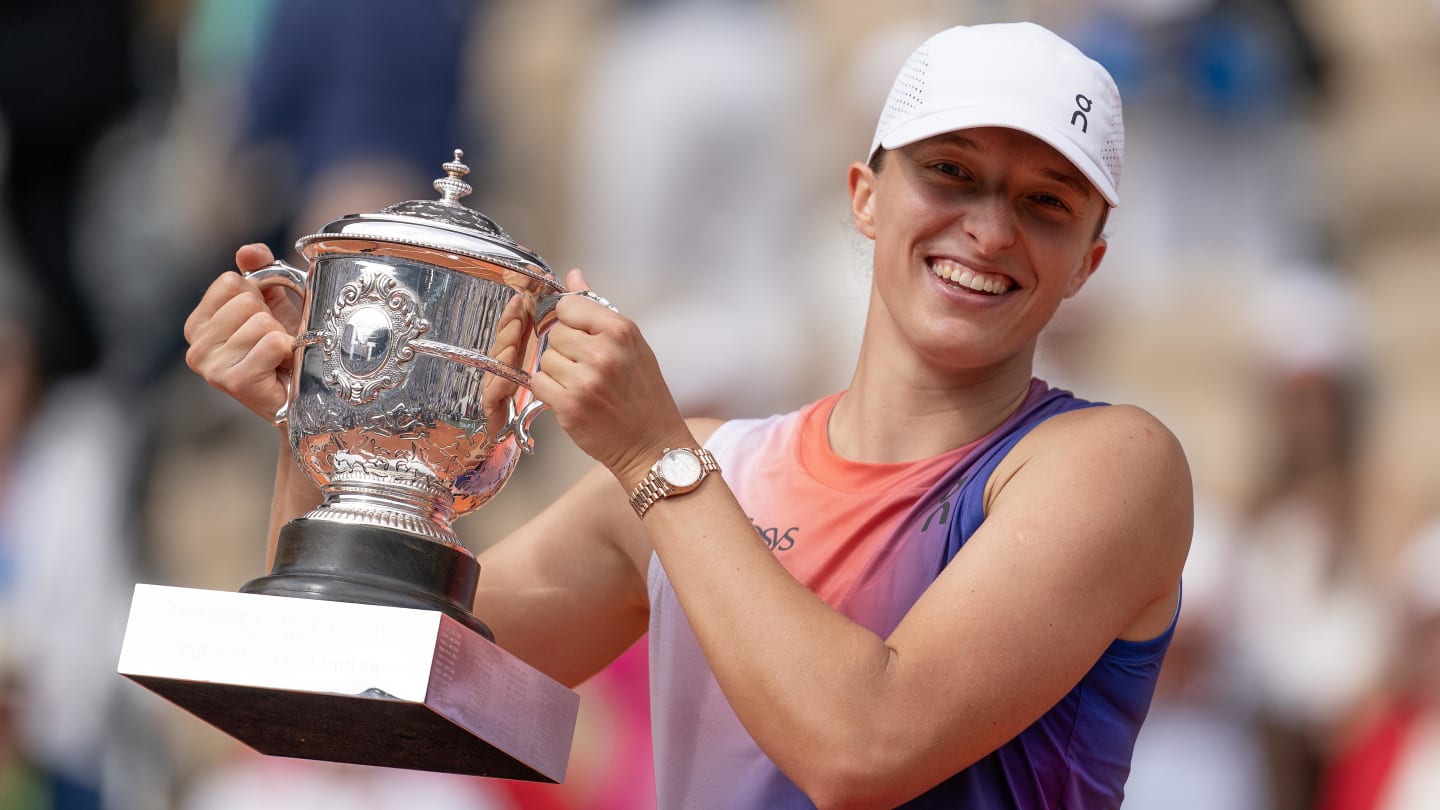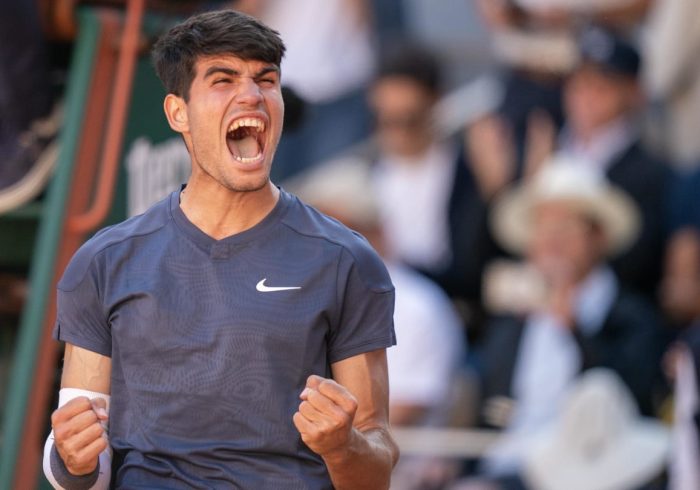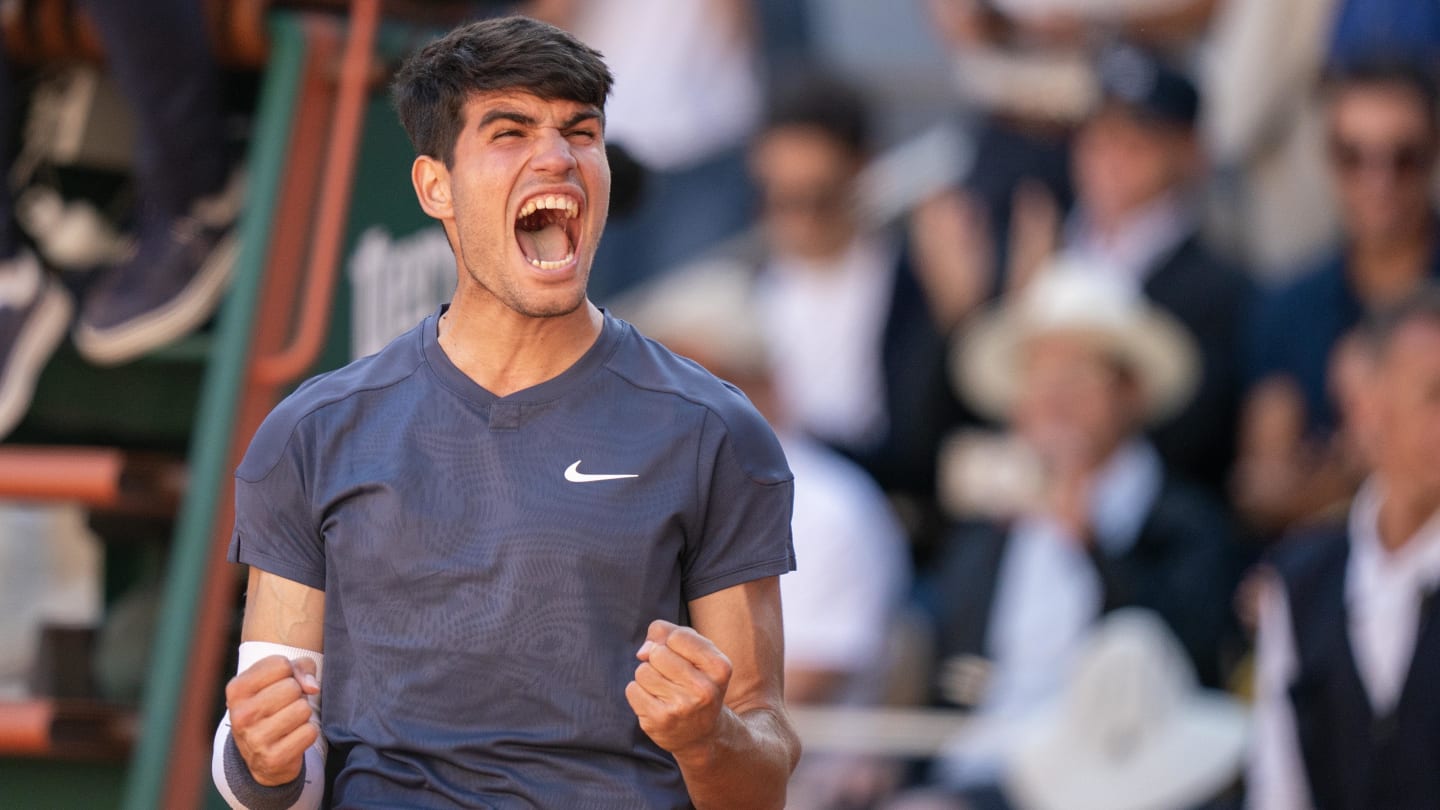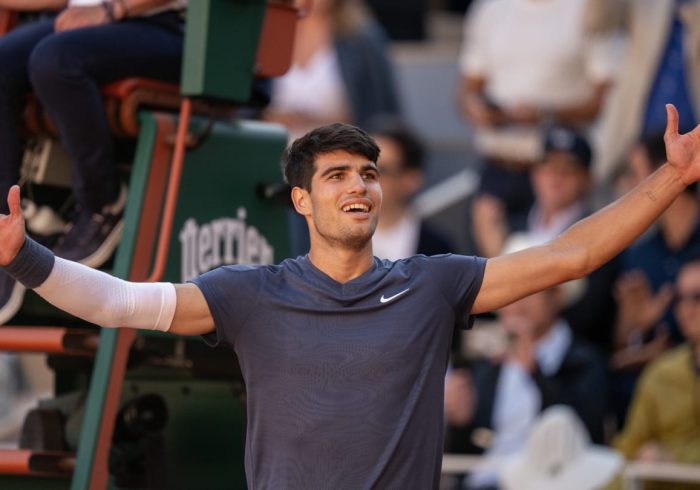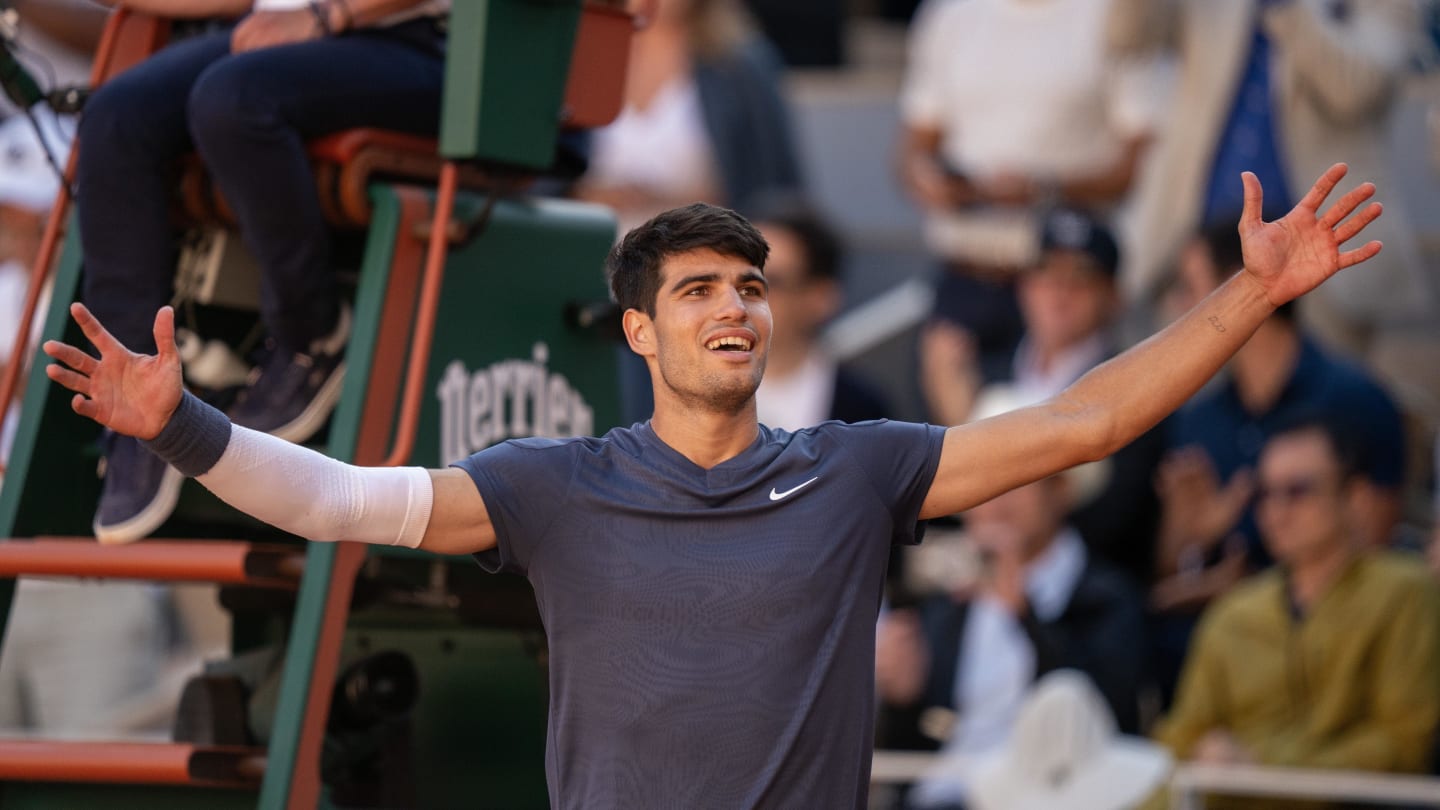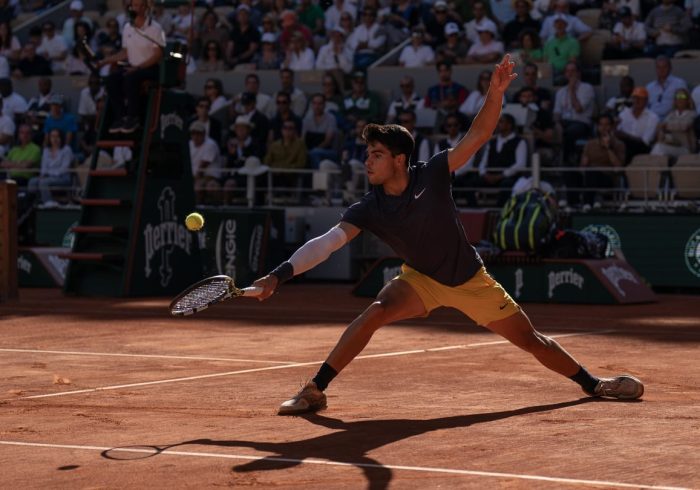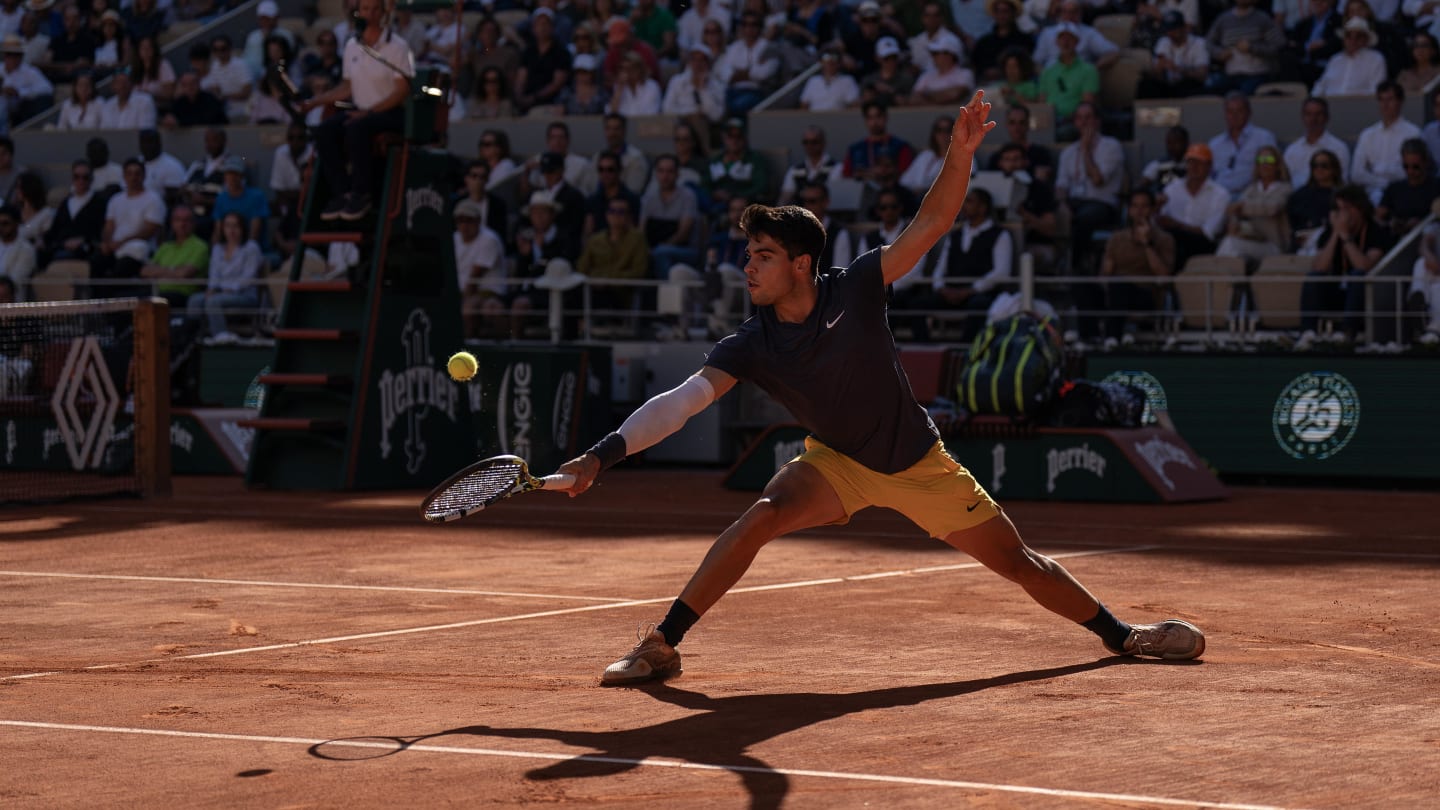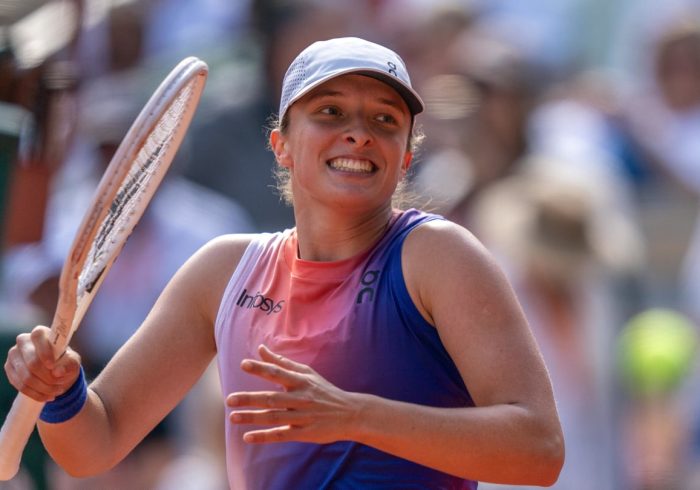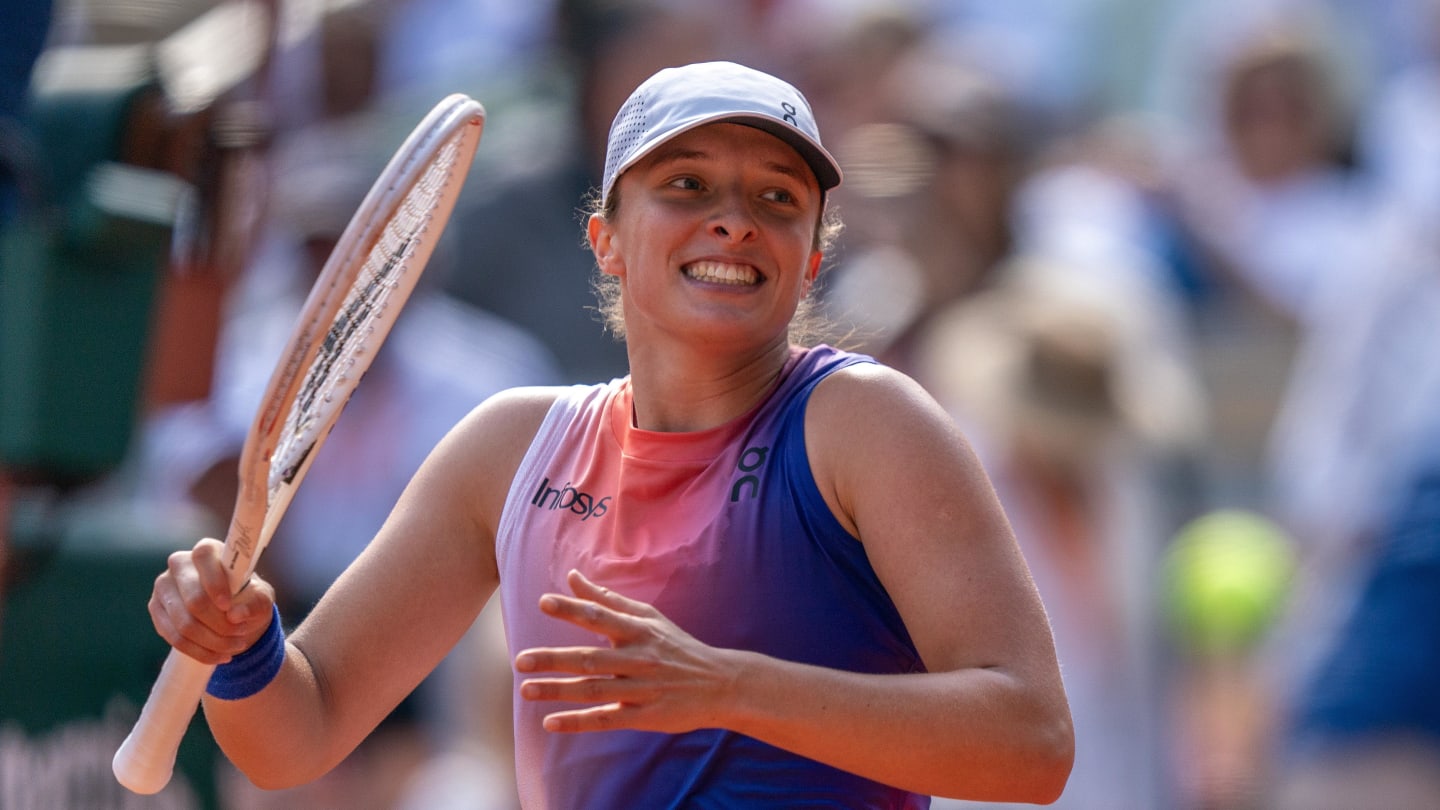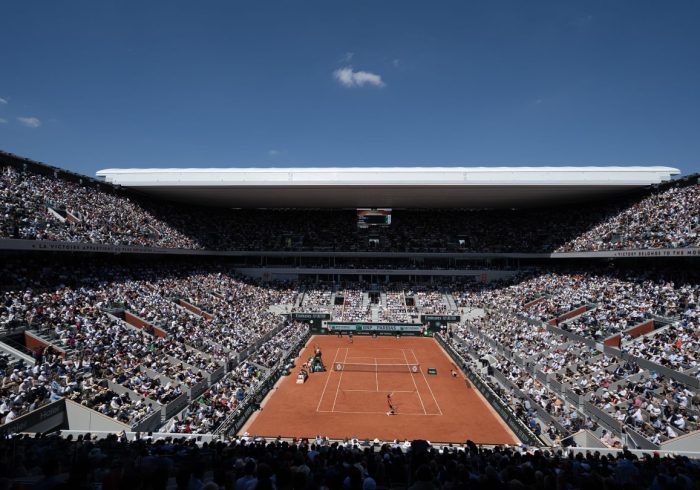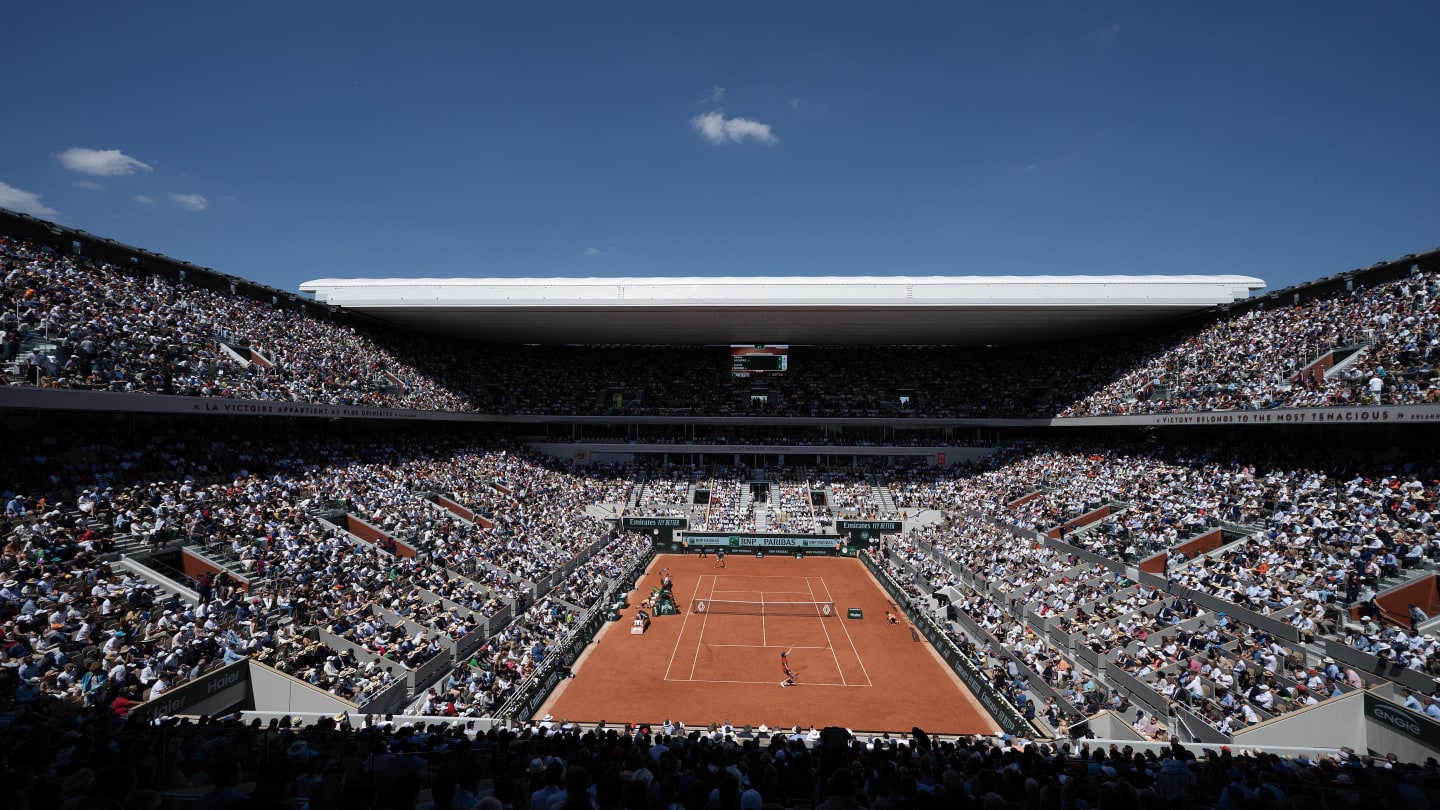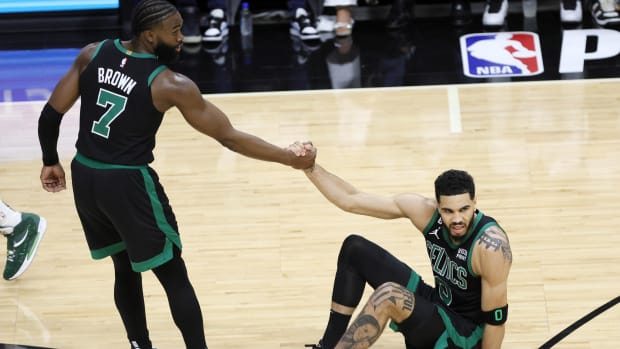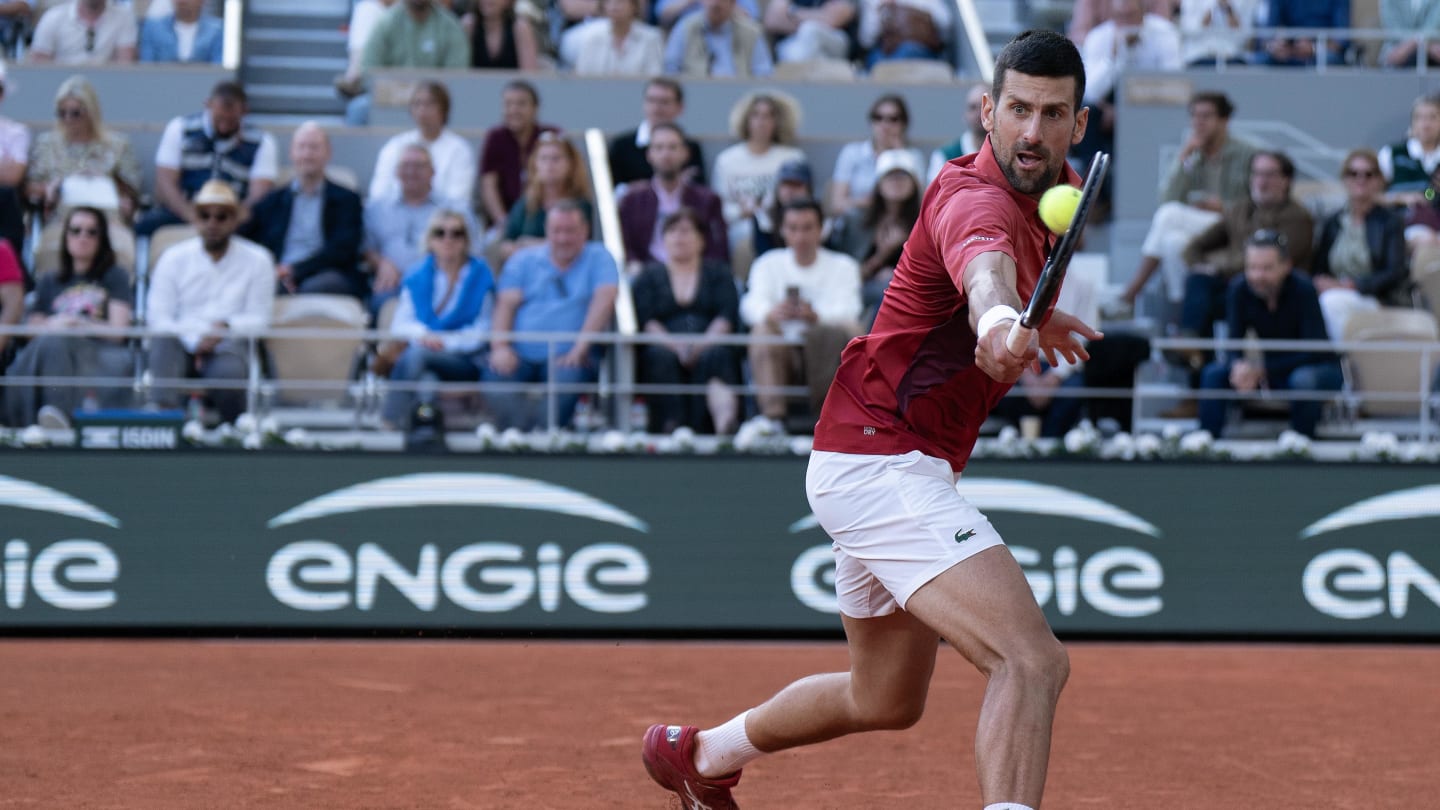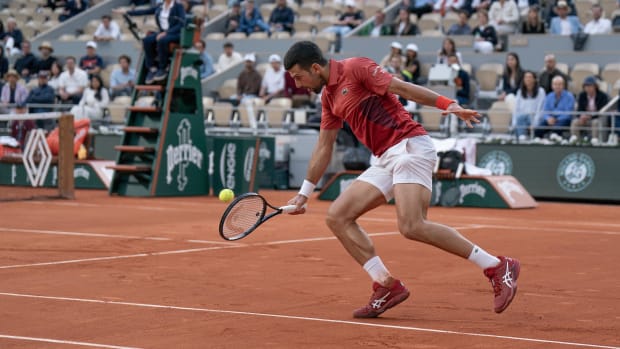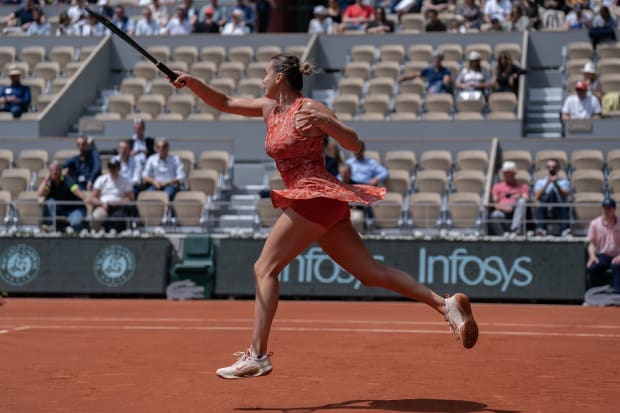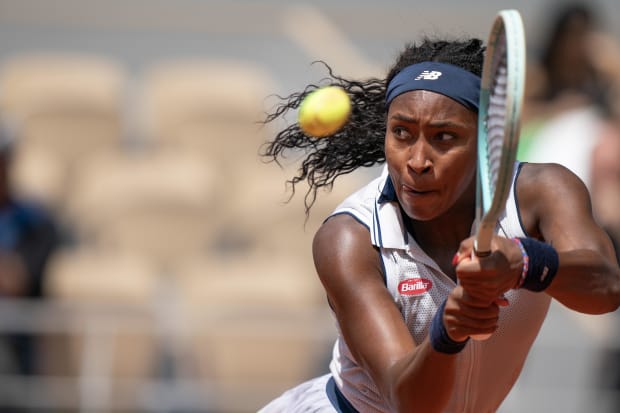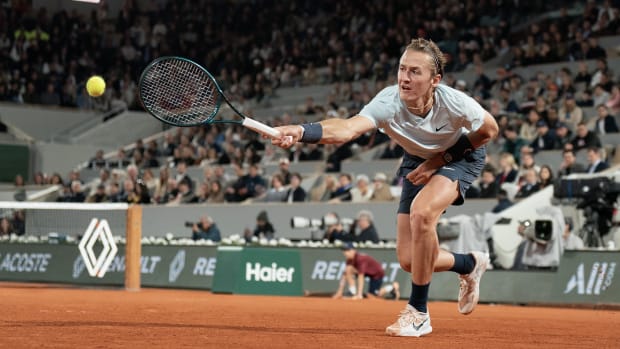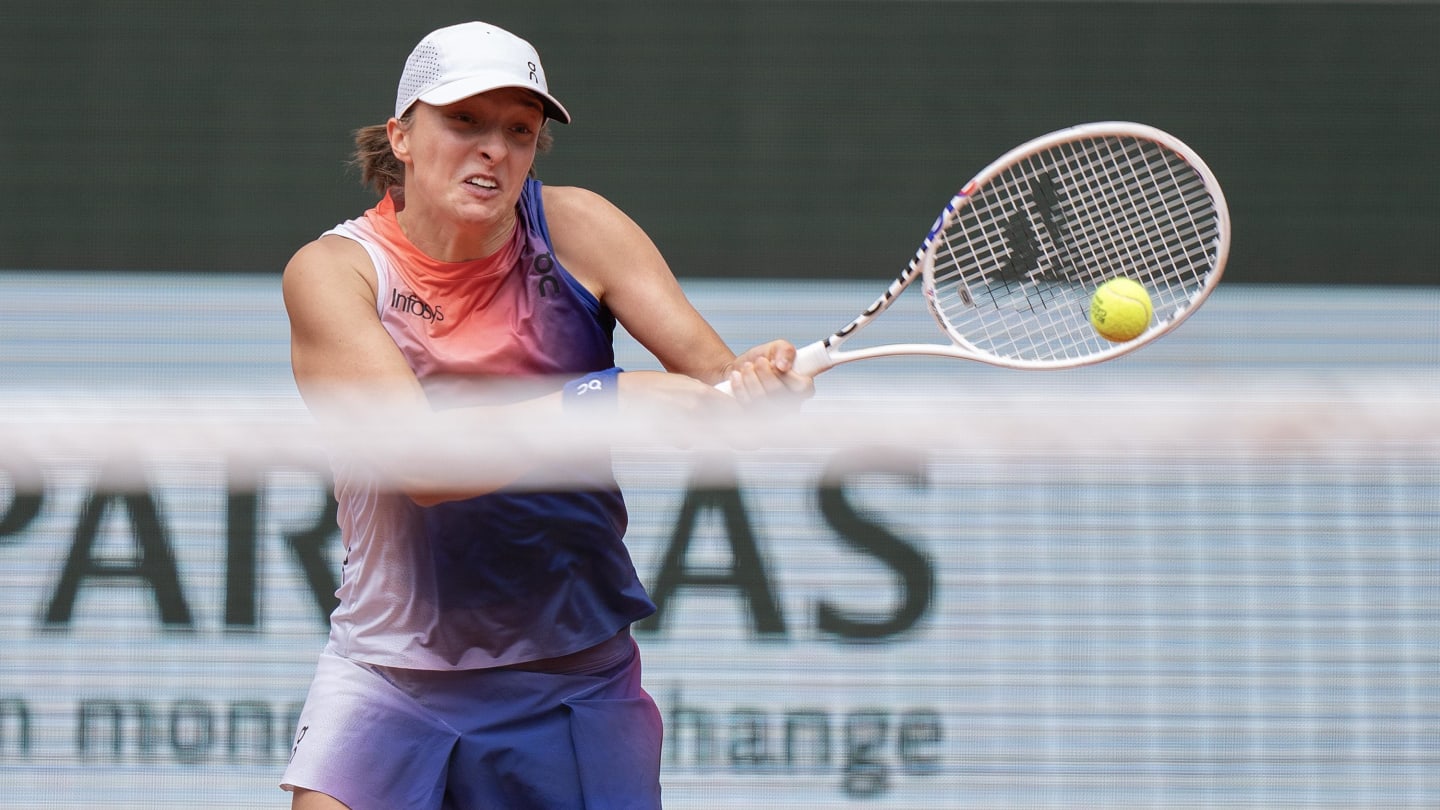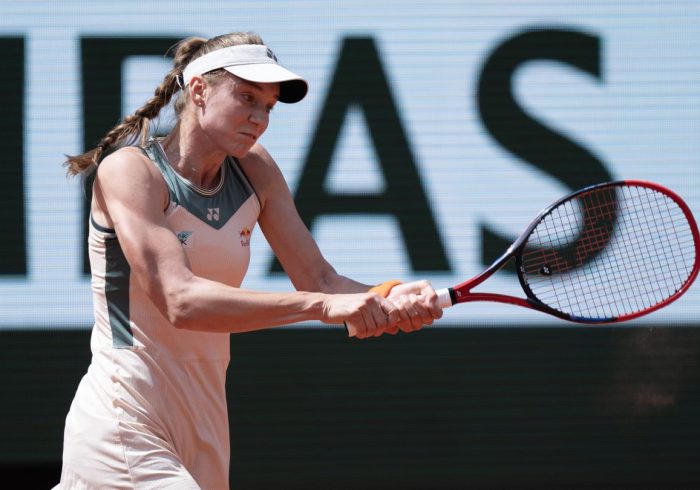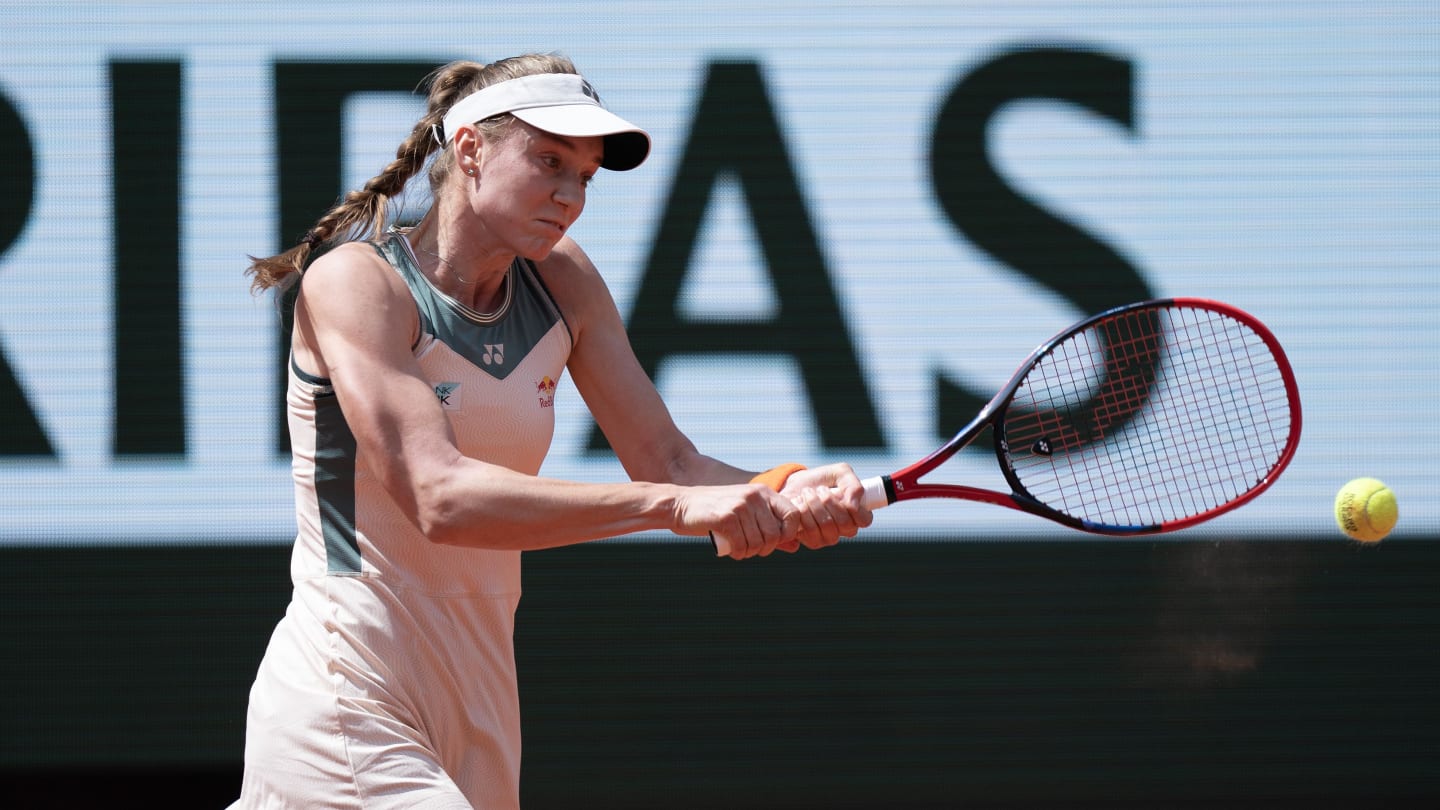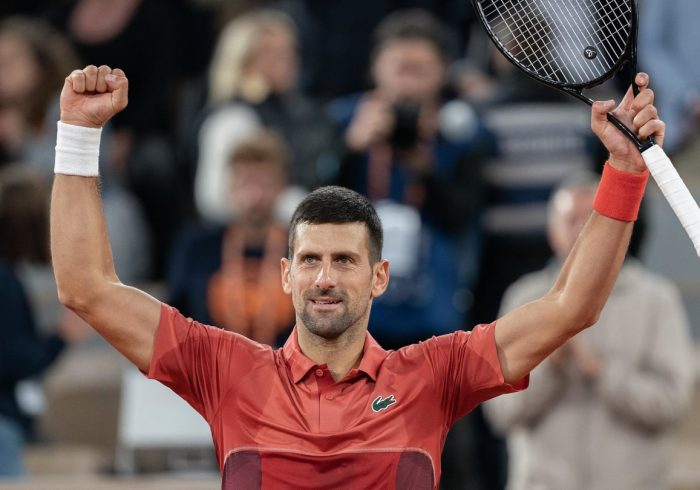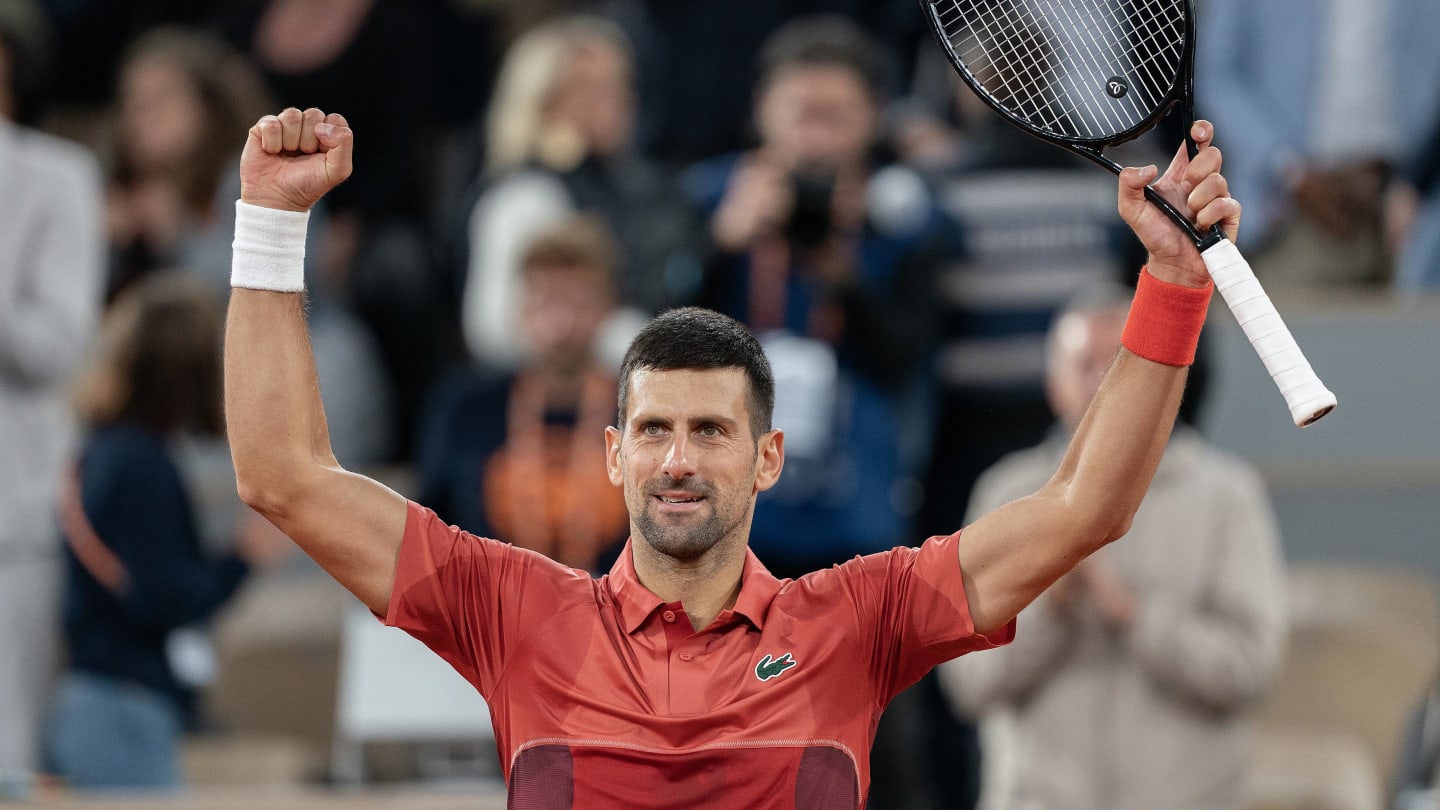50 Parting Thoughts From the 2024 French Open
Cleaning out the notebook and Notes app after Roland Garros 2024. Your 50 Thoughts column for Sports Illustrated …
1. Another French Open, another title for Iga Swiatek, who cements herself on clay. Her fifth major—and third straight here—entailed her staving off a match point … and also cruising as if playing a version of the sport thoroughly elevated from the player on the other side of the net. Here’s a Tennis Channel interview we did after the final.
2. A theme of transition echoed through this event. In the first round, Rafael Nadal, the 14-time champ was defeated. In the middle rounds, Novak Djokovic, a 24-time major champ, withdrew because of a knee injury. In the final match, the heir apparent, Carlos Alcaraz won his third major, taking out Rafa-slayer Alexander Zverev in a wild and sometimes brilliant final. Alcaraz, who turned 21 last month, is the youngest player to win majors on all three surfaces. He is now ranked No. 2 and goes on to defend his Wimbledon title.
3. Jasmine Paolini, age 28, entered as a player on the cusp of the top 10. Still, she was a revelation, such a likable, high-energy player who won six matches in singles and five in doubles. In her first major final—her first major playing beyond a fourth round—she didn’t have much in the way of answers to Swiatek’s questions. But what an event. And she is now up to No.7.
4. Zverev will be devastated to lose his second major final in five sets. After stealing the third set from Alcaraz on Sunday, he was on the threshold ... and retreated. Some salve: he is the only player—male or female—to reach the semis or better here in four straight years. He still has time to break through. In a chaotic week (more on this below) he showed the ability to either concentrate or compartmentalize. But this will sting.
5. Coco Gauff has a winning game and a winning personality. She also has an “Iga Issue,” now 1–11 against the No.1 player, her conqueror in the semifinals. Still, Gauff is now ranked No. 2 and heads to Wimbledon where A) she first made her mark (gulp) five years ago and B) is defending little in the way of points, having lost in the first round in 2023, the catalyst for her streak and C) comes to the surface where Swiatek is most vulnerable.
6. A bittersweet event for Jannik Sinner. He leaves with the No.1 ranking, inherited awkwardly when Djokovic withdrew, but well-deserved. The math doesn’t lie. He also must be happy with how quickly and thoroughly he recovered from the hip injury that caused him to pull out of Rome. In the semis, he was up a set and 2–0 against Alcaraz, let up on the accelerator a bit and lost in a wild and episodically awesome five-setter, another entry into the sport’s hot new rivalry.
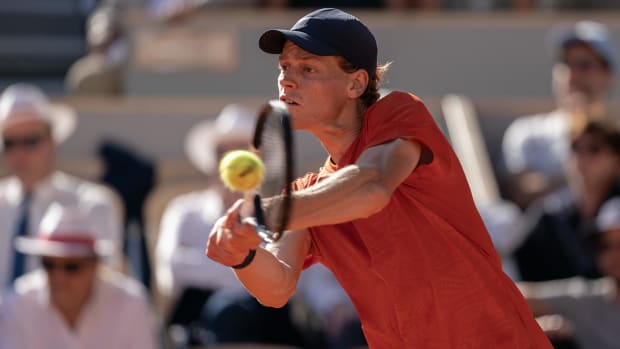
7. A few weeks after turning 17, Mirra Andreeva reached the semifinals of her first major, beating the winner of the previous major (Aryna Sabalenka who, yes, was sick) in the quarters with a mature and composed performance. Then, in the semis, she acted her age, could scarcely find the court and won four games against a player she beat last month. But who can doubt that she is a future star and—warning: French metaphor ahead—the barrel of grapes will soon become wine.
8. The running joke: Naomi Osaka should have been awarded the runner-up trophy, having come within a point of defeating and unseating Swiatek in Round 2. It’s odd to use this phrase to describe a four-time major winner. But I would argue Osaka was right up there with Paolini as the revelation of the tournament.
9. El Salvador’s Marcelo Arevalo and Mate Pavic from Croatia triumphed over the Italian team of Simone Bolelli and Andrea Vavassori to win the men’s doubles title. This victory marks Arevalo’s second Roland Garros title in three years. While for Pavic, it completes a career Grand Slam, having won four titles with different partners.
10. Gauff did not leave Paris trophyless. She teamed with Katerina Siniakova to win the women’s doubles, her first major in doubles. They beat Paolini and Sara Errani in the final.
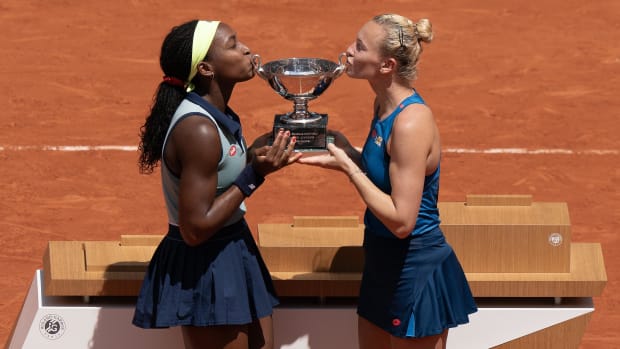
11. Rafael Nadal may have lost in Round 1, but there was another 22-time major winner in Paris. Top-ranked Diede de Groot won the women’s wheelchair singles title when she rallied to beat unseeded Zhu Zhenzhen 4–6, 6–2, 6–3 in the final. In the men’s wheelchair final, second-seeded Tokito Oda of Japan successfully defended his title by winning 7–5, 6–3 against No. 3-seed Argentine Gustavo Fernandez. It was the 18-year-old Oda's fourth major title. This also marked the first year of junior wheelchair events.
12. An American French Open juniors boys champ … Kaylan Bigun, an 18-year-old from West Hollywood, Calif. Headed to UCLA, Bigun defeated Poland’s Tomasz Berkieta, 4–6, 6–3, 6–3. He’s the first American to win the boys’ singles title at Roland Garros since Tommy Paul in 2015. The first all-Czech junior singles Grand Slam final in history saw No.12 seed Tereza Valentova defeat No.3 seed Laura Samson 6–3, 7–6(0).
13. In the strange (and slightly awkward) alchemy that is mixed doubles … Edouard Roger-Vasselin and Laura Siegemund downed Desirae Krawczyk and Neal Skupski 6–4, 7–5 to clinch the title.
14. It didn’t rain much in Week 2, but there was still a dousing. Djokovic, pulled out of his quarterfinal with a knee injury, giving up his title defense, surrendering the No.1 ranking and shrouding the remainder of his summer (career?) in doubt. I have been told that he was never fully committed to playing Wimbledon. But now, the conventional thinking is that he takes a pass on Wimbledon and makes a last-chance power drive at the Paris Olympics, held—because tennis can’t quit irony—at Roland Garros.
15. Speaking of … though he remains entered, it’s hard to imagine Nadal playing Wimbledon—as even he implied. He, too, will focus on the Olympics and, after that, who knows? Roger Federer’s first Wimbledon was in 1999. Thus, this may mark the first championships in more than a quarter century without Big Three representation.
16. Speaking of … Andy Murray joined Nadal as a first-round casualty, falling—did we mention tennis’s love of irony? We did, didn’t we?—to Stan Wawrinka, the other guy from this era with three majors. The chatter that he might play doubles with big brother Jamie Murray suggests that perhaps this is a valedictory.
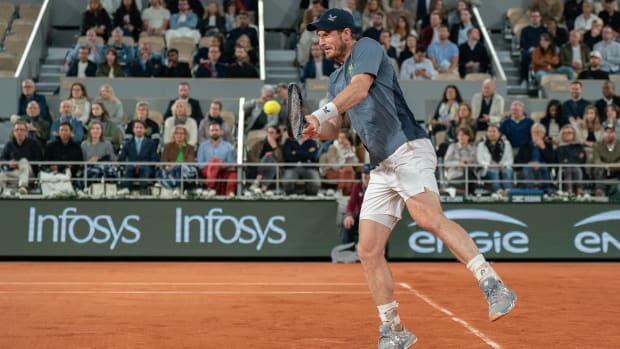
17. The event gets a lot of heat, sometimes deservedly (the scheduling, shabby treatment of WTA players and vacant seats behind the baseline) and sometimes undeservedly. This is not only the smallest of the major venues in terms of physical space but it also operates under the most restrictive civic bureaucracy. Some plusses: 1) Other events go by way of Weimar Republic pricing. It’s lovely that you can buy souvenirs for under $5, food for under $10 and grounds passes for under $50. 2) Between Suzanne-Lenglen—the roof is great— and Simonne-Mathieu, the venue lays claim to two of the great courts in tennis. 3) The indoor practice courts, allegedly coming soon, will help matters.
18. Sabalenka was on an 11-match major win streak, facing little resistance. Then she got ill and was visibly unwell during her quarterfinal. Pity for her. But instances like this reinforce how delicate this sport is.
19. Spare a thought for Stefanos Tsitsipas. Here’s a guy who has been in multiple major finals—once leading Djokovic 2–0 sets in Paris, six games from the trophy. He was part of the sandwich generation, caught between the Big Three and Sinner/ Alcaraz. And now, aged 25, the window appears closed. Also, get this: There were 17 infractions on the men’s fines list for this event. Stefanos and his brother, Petros, were responsible for five (!) of them, totaling $23,000 (all of them for coaching). Perhaps that’s a window into an issue holding him back.
20. A cut-and-paste from last week, but it still holds. Empty suits and empty suites … Tennis has a serious optics problem and it’s especially pronounced here. The grounds are packed. There are no available tickets. The lines for souvenirs and concessions are intolerably long … and the stands in the big court are vacant. The prime seats behind the baseline—the ones shown most often on TV—are about as jumping as Edward Hopper’s diner. Maybe the hedge fund crowd and the FFT suits decided not to show. Maybe they’re drinking wine in a hospitality tent. Whatever. Those seats have to be filled. No other sports league would tolerate this. (We will tackle the issue of no women’s matches in the night sessions in the next mailbag.)
21 For someone who—three years ago, at this very event—ignited quite a cause celebre about her discomfort with press conferences … Osaka overlayed her on-court excellence with such joy and thoughtfulness in the interview room (and on the Tennis Channel set). Tennis brings us plenty of cautionary tales. We should make more of these happier turns.
22. Tallon Griekspoor is such a talented—Tallon-ted, if you will—and versatile player. But his failure to close out against Zverev—a lack of talon, if you will—up two breaks in the fifth set, was downright painful to watch … and, extrapolating, 10 times more painful to experience. Generally, the Dutch tend to do well at Wimbledon. Let’s see how he does. It will take a lot of La Chouffe to drown this defeat.
23. Vote for the cringiest moment of the tournament: Late in his third-set defeat, Hubert Hurkacz—who hardly scans as a firebrand—walked over to his opponent and asked Grigor Dimitrov if he wanted to conspire to replace the umpire. A) The umpire, Alison Hughes, is well-regarded and was on her game in this match. B) Crossing over to the opponent’s side of the court is a serious no-no, as is casual conversation on a changeover. C) You’re doing this at 6–5 in the third set at a major?
Anyway, Dimitrov, to his credit, confused as anyone, basically said, I’m good, dude, the same way you would dismiss a friend asking to invest your 401(k) in a new crypto. And then he won the match.
24. The morning of the men’s semifinal, Zverev settled the abuse case brought by his ex-girlfriend and mother of their child. He admitted no guilt. Neither was this an exoneration, per se. Under the terms of a settlement agreement, Zverev will pay €200,000, of which €150,000 will go to the state and €50,000 to a fund for charities. The court, the defense and the co-plaintiff approved the settlement in the interest of a “peaceful resolution.” There are innumerable angles to this, not least the strange—at least by U.S. jurisprudence—mingling of criminal and civil. (Was this an assessment of facts? Or simply a transaction?) All of this—partner violence allegations, investigations, the stain of accusations that don't result in conviction—is complicated and nuanced and layered … singularly ill-suited for hot takes on social media. Some see this as the end of a witch-hunt. Others see this as Zverev buying his way out of trouble. Perhaps we find agreement here: the ATP desperately needs some sort of domestic violence policy to prevent a repeat of this scenario. Virtually no one (starting with Zverev, but extending to his most vocal critic) was satisfied with how this played out and the scattershot and clumsy approach.
25. A lot of talk here about the boisterousness of crowds. I would push back and argue these are some of the best crowds in tennis. Leave Philippe Chatrier and the crowds are spirited, robust, into the tennis and not their phones. Can we agree? A) Zero tolerance for physical threats or physical acts. B) Zero tolerance for noise when the ball is in play. C) Otherwise … go nuts, and lose your tete.
There is nothing worse in tennis than a dead atmosphere as background to clinking glasses in suites. Partisan fans, fiercely vocal, on the rim of the court, waving flags, accepting Zizou Berg’s post-match importuning? Yes, please. And a ban on alcohol in the seats was little more than a silly bit of Gallic appeasement. There are guys with kegs on their backpacks strolling the grounds. If so inclined, you’ll just step out during a changeover, crush your beer and then walk back inside.
26. Tennis is hard enough without the element of self-sabotage. Apart from slapping balls—that can end up striking fans in the stands, or on the windpipes of officials—time and again, players offloading frustration with acts of self-flagellation was regrettable. Arthur Rinderknech’s own goal will live in tennis lore. I was courtside to watch Andrey Rublev bloody his knee. And Denis Shapovalov could have used the helmet Djokovic brought to Rome. Yes, it’s a stressful sport. It’s always been. For centuries, players of both genders grimaced at their mistakes but stopped short of self-inflicted bodily harm.
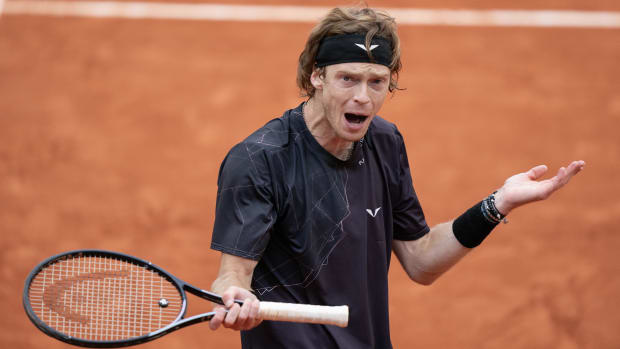
27. A lot has—quite rightly—been made of the Italian tennis invasion. Aside from the obvious candidates, here comes Paolini and Matteo Arnaldi, who scored the upset of Week 1 when he beat Rublev. As for explanations, we hear a lot about “investment” and “training” and “coaching” and establishing tournaments whereby players can rack up points (and bring coaches) without traveling great distances. How about this? Italy does not have a major, so players come up knowing they have to earn spots and be resourceful; not depend on corporate support. (Speaking of Italy, we hear that former Wimbledon finalist and current Euro-ubiquitous Hugo Boss model Matteo Berrettini will be back for the grass.)
28. It did not result in controversy. But what a strange choice by the FFT to do away with net-cord technology and—one step from Fingers Fortescue!—rely on the umpire’s discretion to make let calls. I asked the authorities and was told this simply was a “tournament decision” (As opposed to what and whom else?) and that the umpires and players were polled, and were fine with it. Still, strange. At a time when all the tropism is toward technology, why go analog here?
29. Five players who didn’t make it out of Week 1 but impressed: 6’8” French wild card Giovanni Mpetshi-Perricard, young Italian Flavio Cobolli, and Dutchman Jesper de Jong, who took a set off Alcaraz. For the women’s side, young Hailey Baptiste qualified, won a round and then pushed 12-seed Paolini. I had put Olga Danilovic’s name down in the pre-write. Then, a day after upsetting Danielle Collins (out-Danimal-ing the Danimal) she won again and indeed reached Week 2.
30. Last week we wrote about the mileage players—namecheck Chris Eubanks and Wawrinka—get from the simple gesture of handing a young fan a racket. I’m thinking why not turn this into a social convention of majors? Players have no problem cracking rackets when frustrated. (Remind me to tell you my Hamad Medjedovic story.) If equipment is this expendable, why not give a racket to a kid at a major and make a fan for life?
31. It is a fact of tennis—of any binary sport—that if some players are streaking, others are slumping. Just math being math. That said, Frances Tiafoe cracked the top 10 a year ago. He is now struggling—in an uncertain coaching situation—and playing sub.-500 ball since the U.S. Open. Adjacent conversation: Amanda Anisimova—who came within a few games of reaching the final here in 2019—made a stirring return after a leave of absence. Since then it’s been tough going, including a 6–2, 6–1 defeat here in the second round. She also is no longer working with Marc Lucero.
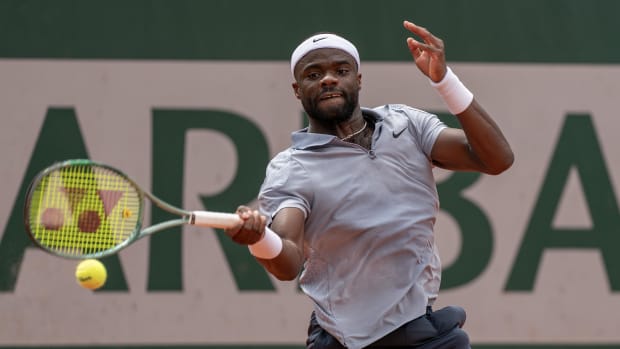
32. Sometimes we do an item on how one point turned an entire match. There were tons of these intervals this tournament. Arnaldi was a point from going up 2–0 sets on Tsitsipas. Nerves set in and he scarcely won another game. Griekspoor was up two breaks on Zverev in the fifth set. He double-faulted, and missed a routine ball, realizing his nerves were announcing themselves—and ballgame. Late in the third set against Swiatek, Osaka missed an easy forehand into the net and scarcely missed another ball. Sorry to do this to Federer fans but it’s another recall of the 2019 Wimbledon final. You spend incalculable hours practicing—and watching—tennis. And matches (history?) pivot on a few points, a few inches.
33. “Not everything that can be counted counts,” as attributed to Albert Einstein. … Can we retire—or at least refine—a stat? Kei Nishikori won his first-round match against Canadian qualifier Gabriel Diallo in five sets, making him the only player to hold an 80% record in five-setters. Higher than Federer, Nadal and Djokovic. Awesome, right? Except … 20 of Nishikori’s 24 wins came before quarterfinals. And, if my math is right, the average ranking of the defeated opponents exceeded 100. (Diallo, for instance, was No. 166.) This means Nishikori prevailed in the end (props) but expended more time and energy than he should have against lower-ranked opponents. That’s a world away from defeating Federer in a five-set Wimbledon final (as Djokovic and Nadal did) or beating Nadal in a five-set Australian Open final (as Federer did).
34. I always enjoy talking to stringers, the unsung (and unstrung) heroes of these events. Trivia: Which player uses the highest tension? The lowest? The most string jobs? Answers: Norwegian doubles player Ulrikke Eikeri wins at 90 (!) lbs. The other extreme, Adrian Mannarino comes in at 10kg or 22 lbs. Holger Rune played only four rounds and went through 57 string jobs. Gauff topped 50, though note, she played double-digits between singles and doubles.
35. We often talk about the benefits of college tennis. The education and BA degree reduce pressure to win, because players have a fallback when they turn pro. College is a safe haven where players can mature emotionally. There’s the socialization, the camaraderie, the training and facilities. Here’s another benefit: The atmosphere of college matches translates well to the pros. When, say Ben Shelton (Florida), Collins (UVA) or Peyton Stearns (UT) are in a close match, with fans near the court, sometimes amid partisan, even hostile, conditions … they are in familiar territory. On the other hand …
36. Even more than There are too many foreign players taking roster spots, lately the college tennis lament I hear most goes like this: The cheating is out of freakin’ control! I was speaking to a recent college player of distinction, who was describing not just acts of egregious hooking—some of them immortalized on YouTube—but the dark arts of it all. Turning your back on lobs so the opponent can’t see the ball bounce, as you inevitably call it out. Swiping ball marks on clay. Calling a let on an ace. Coaches walk away smiling after their players cheat; conveying approval, but if confronted, offering plausible deniability, Sorry, I didn’t see it. This has clearly gone from isolated dishonorable acts to part of the culture. And it's even impacting tactics. As my friend told me, “I would go to the drop shot more, because I knew anything even close to the baseline would probably be called out.” If honor or shame aren’t the solutions, maybe tech is.
37. Who is old enough to remember when the majors took the unusual step of aligning and announcing plans for a 14-event Premier Tour? Remember that? The effort, made public earlier this year, has lost considerable momentum. The ATP-driven Tennis Ventures—which will include Saudi money on the condition The Kingdom is granted a 10th masters event—has emerged as the clubhouse leader. The hitches: A) Timing. The Saudi event will likely be slotted in the first week of the year, but that conflicts with January’s Australian Open. B) Will this event be joint with women, which will require the WTA to amend its rules (and endure another PR hit for bringing its business to a country with an appalling, if improving, record on women’s rights)? C) Can this be done for 2026, or has so much foot-dragging pushed this to ’27?
38. More from the smoke-choked backroom … Before the tournament, Julia Boserup was voted in as WTA Board Player Member. She did not have the on-court career of Nicole Pratt or Daniela Hantuchova, much less Martina Navratilova, three of the candidates she beat out. On the other hand, she has an MBA from the University of Chicago Booth School of Business … The WTA board chose an American (basketball) candidate over a British (Formula One) candidate and named Portia Archer as the new CEO. (Critically, she will report to chairman Steve Simon.) The Saudi PIF rankings sponsorship will earn the WTA $15 million a year for five years, I’m told. Not exactly Jon Rahm’s or Christiano Renaldo’s windfall. But it will move the WTA from the red to the black.
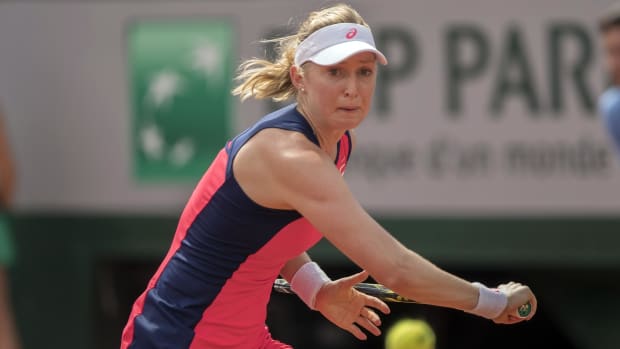
39. Remember Yana Sizikova, the Russian doubles player arrested for alleged match-fixing in 2021? She was cleared in ’23 … and was back playing doubles here, reaching the second round with Anastasia Potapova.
40. As is the case at most events, a team of gendarmes roamed the grounds trying to spot the courtsiders who illegally stream matches from their phones, looking to take advantage of slight time delays and lay down bets. I’m told that a double-digit number of these culprits were ejected during the tournament. The assumption is that they are gambling. But that can be hard to prove. So these crooks are tossed out, on grounds that they are impermissibly rebroadcasting and retransmitting content. (Public service: if you see someone holding up a phone during a match for an extended period of time, alert tournament staff.)
41. Documentary mania … Federer’s documentary Twelve Final Days is dropping soon. Nadal was trailed in Pairs by a phalanx of documentary cameras. And, not to be outdone, we hear that Djokovic is deep in talks to enlist the filmmaking services of Jason Hehir, director of The Last Dance.
42. The Boulevard of Broken Dreams that is the qualifying draw … Dominic Thiem was snubbed for a main draw wild card, a decision either validated or made to look even more cruel when he lost in qualies. Another soon-to-be retiree, Diego Schwartzman, didn’t go through either. Remember young Dino Prizmic, who announced himself in Melbourne taking a set off Djokovic? He fell quietly in Round 1. Both Fruhvirtova sisters failed to qualify. Same for Aliaksandra Sasnovich, who is (kinda sorta) the last player to beat Serena Williams at Wimbledon.
43. What do Steve Kerr, Duke guard Jared McCain, Pete Carroll and millions of tennis players of all levels have in common? They have been captivated by The Inner Game of Tennis. This sacred text for athletes and coaches—wildly ahead of its time; predating the sports psychology wave by decades—is turning 50. I reread it over Roland Garros (hold your applause, please; it’s all of 132 pages) and it holds up. In honor of the anniversary, a new edition will be issued this summer, foreword by none other than Bill Gates.
44. Daria Kasatkina, seeded No.10, lost in the second round to Stearns. More importantly, she is a player deserving of our admiration, “The Most Courageous Woman in Tennis,” as one observer called her. Here’s a piece we did for CBS Sunday Morning.
45. This is simply a source of amusement and not a gripe. But the press conference translations of French players often make for rollicking comedy. “I needed to control my sensations.” … “In the second set, she expressed vigor.” … Say, how did Caroline Garcia turn around her opening match? “I came back, broke back, and it was important to be extremely solid and robust.” How did Richard Gasquet win the match point? “He was coming to the net on his back shot, and I knew I could shoot the passing shot.” Corentin Moutet before playing Sinner: “It's not my first goal to make people crazy … but in tennistic terms it's a good quality.”
46. I had the good fortune of doing courtside interviews here for Tennis Channel. And—to generalize a workforce of hundreds—it remains so striking how collectively cool the players are. Male. Female. Older. Younger. American. Non-American. Political. Apolitical. Compared to other tennis eras. Compared to other sports. In a vacuum … It’s up to the adults to do right by them, to stop with the self-dealing and flagrant conflicts, to solve the sport’s governance issues and fragmentation. But fans should be confident knowing that, overall, the athletes themselves are deeply worthy of their support.
47. I also had the good fortune of doing some desk work at Tennis Channel with young Noah Eagle, fresh off his Emmy win. So thoroughly professional and dignified—entertaining, without making it about him and his personal brand. A sports polyglot but totally knowledgeable about tennis. Insert Bill Raftery voice: A bird in ascent! ... And speaking of TV, it is interesting how the NBA rights derby impacted the Roland Garros U.S. broadcast picture. The great NBA sweepstakes winner, NBC, which has broadcast from Paris since the 1970s is out and Warner Bros. Discovery will take the court in 2025.
48. It makes for a fun thought exercise. But the data does not support the superstition that a player is better off winning a set 6–1 than winning 6–0, thereby motivating the humiliated opponent. Over the last four years, WTA players winning a set 6–0 win the next set 80% of the time and those winning 6–1 win the next set 71% of the time. (h/t Hawk-eye.)
49. Does Anyone else think that we, as a tennis community, need to crowdfund a Camila Giorgi documentary? Amid this Italian tennis boom … An Italian player who won four titles and pierced the top 30 retires abruptly—before two majors and a minimum of $150k guaranteed—amid familiar allegations of grifting, and suspicion of leaving the country to avoid tax accusations. She is also accused of stealing an antique table. That’s not merely a wild tale. That’s an elevator pitch.
50. From the icky self-promotion department, subscribe to Andy Roddick’s Served podcast here. And anyone wishing to receive the weekly SI tennis mailbag via email can DM me.
Fin! See you at Wimbledon!
